


examination before cataract surgery
examination before cataract surgeryis the leading cause of blindness worldwide. The World Health Organization (WHO) reports that an estimated 19.34 million people globally are blind due to age-related cataracts, accounting for 43% of all cases of blindness.1。隨著人口增長,壽命延長,世界上盲人的數量及白內障致盲的比率將會持續上升。常見白內障症狀有視力模糊、出現眩光、景物顏色變得暗淡等 。而導致白內障的成因包括:晶體老化、眼疾導致等。現時首選的調理方法是微創超聲波切除白內障手術,然後植入人工晶體 (單焦距晶體或多焦距晶體),一般無須住院,術後亦不會 復發。
1Source: World Health Organization
What is Cataract?
A cataract is a change in the protein of the lens in the eye that gradually degrades, hardens, and becomes opaque, so that vision is blurred as if covered by a foggy lens. The disease is likely to occur in one or both eyes, which, however, do not spread or infect each other. The condition varies depending on the location and degree of clouding of the lens. Vision loss also varies from person to person and can be severe enough to cause blindness.
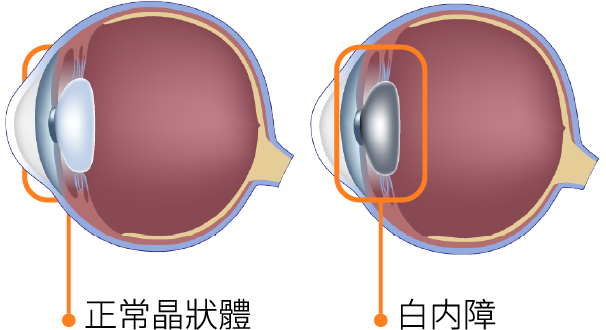
Symptoms of Cataract
Early-stage cataracts do not show any obvious symptoms, but as the condition becomes more severe the following symptoms may occur:

Blurred vision

Glare appears

Landscape colours
become dull

Double or multiple
vision in one eye

Refractive errors get worse
(myopia, astigmatism)
Causes of Cataract

Aging of the lens
with aging

External Trauma

Excessive ultraviolet- /
infrared-light exposure

Metabolic diseases
(e.g. diabetes)

Drug-induced
(e.g. prolonged use of steroids)

Other eye illnesses
(e.g. high myopia)

Congenital or genetic factors
Phacoemulsification
Cataract removal surgery
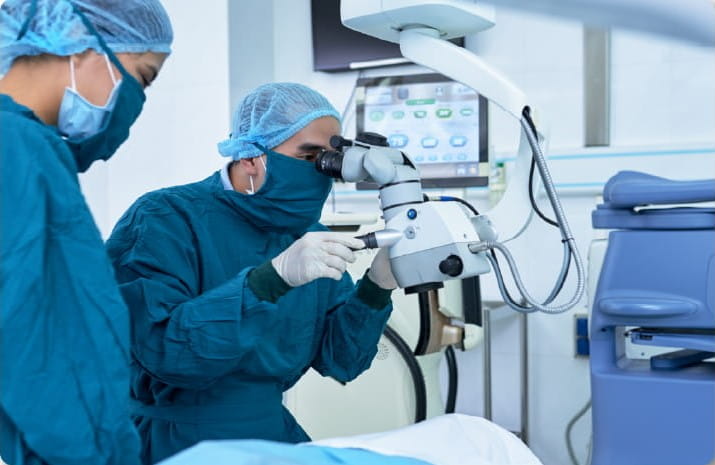
目前沒有藥物可有效避免或調理白內障,白內障手術是唯一被公認為有效調理白內障的方法。
微創超聲波切除白內障手術是現今首選的調理方法。手術只需要局部麻醉,主要的手術方法是用超聲波乳化白內障成碎片,吸走細塊再植入人工晶體。手術後眼睛後囊會變得清晰,光線能再次聚焦在視網膜上,同時恢復視力及減少屈光不正。手術時間短,病人即日便可離開及痊癒時間快。
Local anaesthesia
Go home on the same day
of the surgery
Surgery can be
as short as 10-20 minutes
Minimally invasive
surgery has small wounds
Reduce refractive errors
(myopia, hyperopia, presbyopia and astigmatism)
Low risk of wound
infection and complications
Local anaesthesia
Go home on the same of the surgery
Surgery takes only 10-20 minutes
Minimally invasive
Reduce refractive errors (myopia, hyperopia, presbyopia, astigmatism)
Low risk of wound infection and complications
Procedure of ultrasound cataract surgery

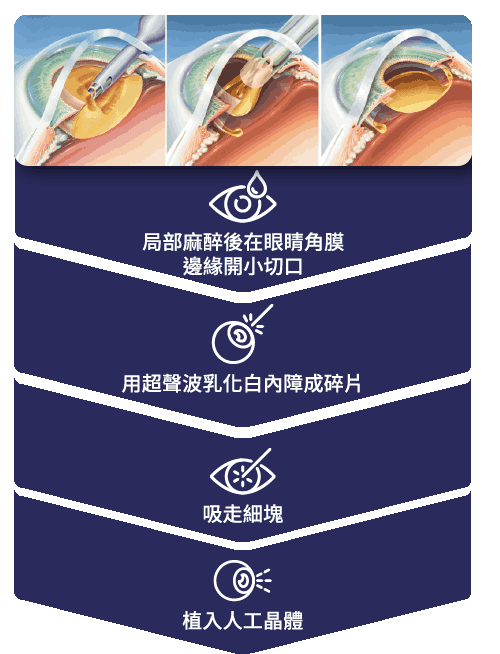
Types of Intraocular Lens (IOL):
| Monofocal Lens | Multifocal Lens (Trifocal) | Multifocal Lens (EDOF) | |
|
|
Good vision at one distance | Good vision at multiple distances | Good vision at multiple distances + Extended depth of field |
|
|
Excellent, delivers good vision at far, medium or near distances | Excellent, delivers good vision at far, medium or near distances | Excellent, delivers good vision at far, medium and near distances; continuous vision at a range of distances; less halos and glare |
|
|
Optional | Optional | Optional |
|
|
Inability to focus on near and far vision at the same time | Inappropriate for people with high vision requirements at night, such as night-shift drivers | Absence of trifocal features for near distance |
|
|
|
|
|

Preparing for Cataract Surgery

- Comprehensive eye examination, including vision exam, corneal exam, etc.
- Choose the right IOL according to your doctor's recommendation
- Please follow your doctor's advice when prescribing medication for pre-operative use if necessary
- Please inform your doctor in advance if you are taking medication for a long period of time
- It is advisable to arrange for family or friends to pick up after the surgery
- You can eat and drink as usual before the operation


Postoperative Care

- Follow your doctor's instructions on the use of medication to prevent infection and reduce inflammatory response
- For 1 to 2 weeks after surgery:
- Do not rub or scratch your eyes at any time
- Do not bend over to wash your hair or shower to prevent splashing water into your eyes
- Avoid strenuous exercise, running and jumping to prevent increased intraocular pressure which may affect wound healing
- During the first week of recovery, it is recommended to wear an eye shield when sleeping to prevent unintentional contact with the wound
- Follow up on your doctor's advice to ensure you are well after surgery

Cataract Surgeries Programme
(Cataract Surgery Subsidy Scheme)
我們的眼科專科醫生為醫院管理局「Cataract Surgeries Programme」指定醫生之一。
歡迎合資格人士在本中心本接受白內障調理。
Details of the Programme can be found here.

Cataract FAQ
Should I wait until the cataract get mature?
白內障成熟指眼睛裡的晶狀體不透明性增加至乳白色或琥珀色。它已經擴散到晶狀體邊緣,對視力有相當大的影響。白內障成熟度越高,調理的難度亦會相應提高,所以白內障手術建議不需要等到成熟才做。
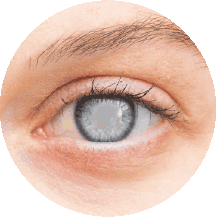

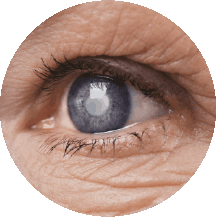
Can cataract surgery alleviate other eye problems?
It can reduce refractive errors (myopia, hyperopia, presbyopia, astigmatism).
Will cataracts recur after surgery?
No, because once the intraocular lens is implanted, it can be used for life without replacement unless it cannot adapt or cope with daily needs.
Does cataract surgery need to be done in hospital?
不需要,白內障手術屬於微創手術,雖然患者調理過程清醒,但大多數患者並不感到疼痛,亦可即日回家。
What precautions should be taken after cataract surgery?
- To prevent increasing intraocular pressure and affecting wound healing, please avoid bending/leaning over, sneezing, driving on the second day after surgery, and engaging in strenuous exercise such as cycling, jogging, swimming or aerobic exercise within 1 to 2 weeks. Or consult your doctor if the situation permits.
- Do not rub or scratch your eyes at any time
- It is recommended to sleep on your back and wear an eye mask to prevent unintentional contact with your eyes while sleeping and reduce the risk of infection and irritation after surgery.
- Do not wear makeup, dye or have your hair done for 1 to 2 weeks.
Can I use mobile phones, watch TV, computers and other electronic devices after cataract surgery?
Under normal circumstances, you can watch TV, computer, and use mobile phones one day after cataract surgery. However, due to the brightness of the electronic screen, it may cause some discomfort to the eyes, but it will get better over time.
When can I take a shower after cataract surgery?
You can shower or bathe 24 hours after surgery. But don't let water or body wash get into your eyes. Close your eyes when showering to prevent sewage from splashing into your eyes.
Will I feel tired and uncomfortable after cataract surgery?
There may be a halo in the visual field for the first day or two after cataract surgery, especially after a multifocal lens is implanted, but this will gradually improve. The eyes may also experience irritation and foreign body sensation. Moreover, on the day after the operation and the next day, you may feel tired and you can sleep more. This is the body's way of repairing itself.
Can I go for a walk after cataract surgery?
It is recommended to avoid any exercise for at least one week after surgery. Any discomfort and tenderness caused by surgery will go away within a few days, and you can start with some light to moderate exercise, such as walking or some simple stretches at home.
How many days of rest do I need after cataract surgery?
Everyone’s recovery time is different, but many patients have clear vision within 24 hours of surgery. One to three days of rest is recommended to ensure adequate time for rest, and most patients can return to normal activities within a few days.

